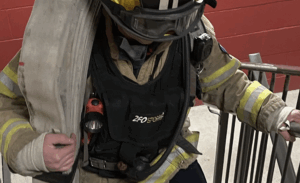If you’re wondering how to become a firefighter in Delaware, you’re not alone.
Pursuing a career as a firefighter in Delaware is both honorable and challenging.
The state has specific requirements and procedures to ensure its firefighters are well-prepared to serve their communities effectively.
This comprehensive guide outlines the steps to becoming a firefighter in Delaware, highlighting state-specific requirements and considerations.
General Steps to Become a Firefighter in Delaware
Becoming a firefighter in Delaware takes dedication, physical and mental resilience, and a strong commitment to serving your community. Here are the steps every aspiring firefighter must follow:
1. Meet Basic Eligibility Requirements
Ensure you satisfy the foundational criteria:
- Age: Applicants must be at least 18 years old at the time of application.
- Education: Possess a high school diploma or General Equivalency Diploma (GED).
- Driver’s License: Hold a valid driver’s license.
- Citizenship: Be a United States citizen.
- Residency: Some departments, such as the Wilmington Fire Department, require candidates to establish residency within six months of employment.
- Moral Character: Demonstrate good moral character; a background check is typically required.
2. Obtain Emergency Medical Technician (EMT) Certification
Many Delaware fire departments require candidates to have at least an EMT-Basic certification. The Delaware State Fire School offers EMT training programs approved by the Delaware State Fire Prevention Commission. Applicants must be 18 years of age or older to enroll in the EMT program.
3. Complete Firefighter Training
The Delaware State Fire School provides comprehensive training programs, including Basic Firefighting Skills, Structural Firefighting Skills, Hazardous Materials Response Skills, and Vehicle Rescue Skills. Completion of these courses is often required for certification.
4. Pass Certification Examinations
Certification testing consists of written exams ranging from 25 to 100 questions, depending on the Job Performance Requirements (JPRs) covered, accompanied by skills evaluations. Successful completion of these exams is necessary for certification.
5. Undergo Physical Fitness Assessment
Firefighting is a physically demanding profession. Candidates must demonstrate physical fitness through assessments that may include tests of strength, endurance, and agility. Specific requirements can vary by department.
6. Complete Background Checks and Interviews
Applicants undergo comprehensive background investigations, including criminal history and driving record checks. Panel interviews assess suitability for the role. Departments may also require medical examinations and drug screenings.
7. Continue Professional Development
Firefighting requires ongoing education. Firefighters are encouraged to pursue advanced certifications, such as Fire Officer or specialized rescue operations, and participate in regular training drills to maintain and enhance their skills.
Differences Between Delaware and Other States
While the general pathway to becoming a firefighter shares similarities across states, Delaware has distinct requirements:
- Training Requirements: Delaware mandates completion of specific courses through the Delaware State Fire School or an equivalent approved by the State Fire Prevention Commission.
- EMT Certification: Delaware requires EMT certification through the Delaware State Fire Prevention Commission, which includes passing the National Registry exam.
- Residency Requirements: Some departments, like Wilmington Fire Department, require new hires to establish residency within a specified timeframe after employment.
Why Scoring High on the Firefighter Exam in Delaware Is So Important
No matter which department you’re applying to, passing the firefighter exam is critical — and scoring high is even more important.
Every hiring process includes three major tests:
- Written Exam – Determines your placement on the hiring list. A higher score = better chances of getting the job.
- Physical Ability Test (PAT or CPAT) – You must prove you can handle physically demanding tasks that mimic fireground operations.
- Oral Interview – This is your chance to show leadership, communication, and character beyond a test score.
Most departments create ranked hiring lists based on total exam scores. Being at the top of that list is the key to getting hired.
Becoming a Firefighter in Wilmington
The Wilmington Fire Department has specific requirements for applicants:
- Must be 18 years of age or older.
- Possess a valid driver’s license.
- Hold a high school diploma or GED.
- Be a U.S. citizen.
- Establish residency within six months of employment.
- Demonstrate good moral character.
- Application Process: Online application with required documents and certifications.
- Apply here: Prospective applicants can find more information on the City of Wilmington’s official firefighter website.
Additional Considerations for Firefighters in Delaware
- Residency Requirements: Some departments require you to live within a specific response radius (e.g., 8-minute response time).
- Ongoing Physical Fitness: Maintain strong conditioning to pass annual physical assessments and safely perform job duties.
- Education & Career Growth: Consider post-secondary education or degree programs in fire science for advancement.
Final Thoughts: How to Become a Firefighter in Delaware
Becoming a firefighter in Delaware — especially in major cities like Wilmington and New Castle County — is competitive but achievable. If you meet the eligibility requirements, earn your EMT certification, and excel on the firefighter entrance exam, you’ll have a strong chance of joining the fire service.
Embarking on a firefighting career in Delaware requires meeting specific state and departmental requirements. By understanding and fulfilling these prerequisites, candidates can position themselves for success in this vital public service role.
Stay focused, stay fit, and prepare for every step. The fire service needs people like you — committed, capable, and ready to protect and serve.










